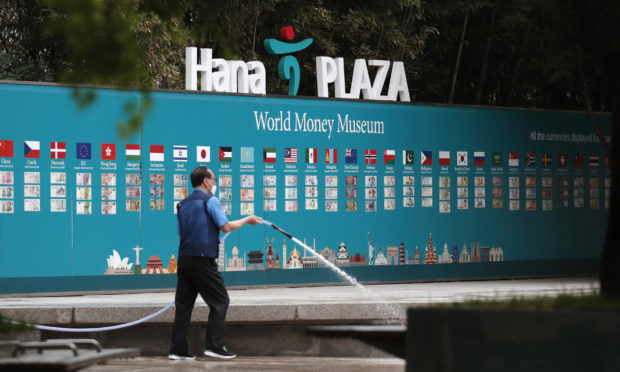BANGKOK — Shares fell Tuesday in Asia as worries over fresh outbreaks of coronavirus cases overshadowed hopes over reopening economies.

A worker cleans near a bank’s currency advertisement board in Seoul, South Korea, Tuesday, May 12, 2020. Shares are lower in Asia as news of fresh outbreaks of coronavirus cases and more infections among White House staff overshadowed hopes Tuesday over reopening economies. (AP Photo/Lee Jin-man)
Japan’s Nikkei 225 lost 0.1% while the Hang Seng in Hong Kong dropped 1.8%. The lackluster start followed a mixed session on Wall Street, where gains for technology and health care stocks helped offset more prevalent losses elsewhere.
Optimism over plans for reopening in many countries after shutdowns aimed at battling the pandemic has taken some hits from reports of new waves of infections in states and countries that are further ahead in lifting lockdown measures. Investors pointed to small but disconcerting increases of infections in South Korea, China and elsewhere.
President Donald Trump insisted Monday his administration has “met the moment” and “prevailed” on coronavirus testing, even as the White House ordered everyone who enters the West Wing, apart from Trump, to wear a mask after two aides tested positive for COVID-19 late last week.
On Monday, Vice President Mike Pence and three of the nation’s top medical experts were in various states of isolation as a precaution.
“All said, risk appetite is on the wane today. And that merely acknowledges that re-opening economies is riddled with risks; struggling between the devil and the deep blue sea,” Hayaki Narita of Mizuho Bank said in a commentary.
China reported that auto sales fell again in April but losses narrowed in a sign the industry’s biggest global market is recovering from the coronavirus pandemic as Beijing eases anti-disease controls.
Sales of SUVs, sedans and minivans in the industry’s biggest global market were down 2.6% from a year earlier at 1.5 million, said the China Association of Automobile Manufacturers, an improvement over March’s 48.4% contraction and a nearly 82% plunge in February.
The industry group said the market shows “obvious signs of recovery.”
But that news and reports of stronger growth in lending did little to lift sentiment. The Shanghai Composite index fell 0.6% to 2,877.71. Hong Kong’s benchmark shed 438.77 points to 24,163.29 while the Nikkei 225 gave up 28.64 points to 20,362.12.
South Korea’s Kospi shed 1.1% to 1,914.49 and the S&P/ASX 200 sank 1.3% to 5,388.20. Shares also fell in Taiwan, Singapore and Jakarta, while Bangkok edged higher.
The future for the S&P 500 dropped 0.9% while that for the Dow industrials also fell 0.9%.
An uptick in cases in South Korea has added to concern over the potential for rebounds in new coronavirus infections in places that relax restrictions. More than 100 new cases were reported that were linked to bars and clubs, 64 of them in the capital Seoul.
China reported only one new case on Tuesday, but that followed double-digit increases over the previous two days that set off renewed warnings to the public to not to become overconfident.
Fresh data reports this week include U.S. unemployment claims and retail sales and Australian jobs. So far, the economic indicators streaming in have been oppressively bad.
Many companies are reporting first quarter earnings, often opting to give no financial forecasts due to overwhelming uncertainty over what lies ahead.
Overnight, the S&P 500 ended the day at a virtual standstill, up just 0.52 points at 2,930.32, rallying back from a 0.9% loss in the morning. The Dow Jones Industrial Average fell 0.4% to 24,221.99, while the Nasdaq composite added 0.8%, to 9,192.34.
Technology and health care stocks dominated gains. Tech companies in the S&P 500 are up 4.1% for 2020 as investors look for companies that can be winners in both a “normal” and a stay-at-home economy.
“People are looking ahead, and they’re saying, ‘OK, the pandemic has happened, and the damage has swept through our economy and our businesses, and now we’re planning on the growth after the carnage, so we’re valuing equities as if we’re going to go back to a decent growth environment,'” said Mike Zigmont, head of trading and research at Harvest Volatility Management. “I don’t know why investors are feeling so comfortable with those expectations.”
The yield on the 10-year Treasury edged to 0.69% from 0.70% late Monday.
Benchmark U.S. crude oil climbed 18 cents to $24.32 per barrel in electronic trading on the New York Mercantile Exchange. It fell 60 cents, or 2.4%, to settle at $24.14 a barrel on Monday. Brent crude oil, the international standard, added 5 cents to $29.68 per barrel. It dropped $1.34, or 4.3% to $29.60 a barrel in London.
The dollar fetched 107.39 Japanese yen, down from 107.66 late Monday. The euro weakened to $1.0805 from $1.0807.